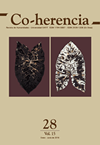El rey Felipe II de España como símbolo de la "tiranía" en los escritos políticos de Spinoza
Main Article Content
Keywords
Philip II, tyranny, religious persecution of dissenters, revolution, historical context of Spinoza’s thought.
Resumen
The highly abstract style of Spinoza’s philosophy has encouraged some interpretations of him as a thinker with little immediate connection with the whirl of social and cultural affairs around him. This article shows that all three major Western revolts - those of the Netherlands, Portugal and Aragon - against Philip II (his principal symbol and embodiment of tyranny, arbitrary and illicit governance, intolerance and repression of basic liberties) became in some sense internationally entwined and were intensely present in his life, which helps to understand that Spinoza was indeed a revolutionary.
Descargas
Referencias
Boyden, J. M. (1999). Fortune Has Stripped You of Your Splendour: Favourites and their Fates in Fifteenth- and Sixteenth-Century Spain. In J. H. Elliott and L. W. B. Brockliss (Eds.), The World of the Favourite (pp. 26-37). New Haven: Yale University Press.
Borges, A. (2002). Los orígenes de Bento de Espinosa. En J. Contreras, B. García & I. Pulido (Eds.), Familia Religión y negocio. El Sefardismo en las relaciones entre el mundo ibérico y los Países Bajos en la Edad Moderna (pp. 25-37). Madrid: Fundación Carlos Amberes.
Den Tex, J. (1960-1972). Oldenbarnevelt, 5 vols. Haarlem: Tjeenk Willink.
Domínguez, A. (1994). Presencia de Antonio Pérez en Spinoza. En A. Domínguez (Ed.), Spinoza y España. Cuenca: Universidad de Castilla-La Mancha.
Elliott, J. H. (1963). The Revolt of the Catalans (1598-1640). Cambridge: Cambridge University Press.
Gascón, J. (2007). Aragón en la Monarquía de Felipe II, 2 vols. Zaragoza: Graf.
Gómez-Centurión, C. (1988). Felipe II, la empresa de Inglaterra y el comercio septentrional (1566-1609). Madrid: Editora Naval.
Israel, J. (2002a). Diasporas within a Diaspora. Jews, Crypto-Jews and the World Maritime Empires (1540-1740). Leiden: Brill.
Israel, J. (2002b). Philosophy, Commerce and the Synagogue: Spinoza’s Expulsion from the Amsterdam Portuguese Community in 1656. In J. Israel and R. Salverda (Eds), Dutch Jewry: Its History and Secular Culture (1500-2000) (pp. 125-139). Leiden: Brill.
Kamen, H. (1997). Philip of Spain. New Haven: CT, Yale University Press.
Koen, E. & Pieterse, W. (1967). Notarial records in Amsterdam relating to the portuguese jews in that town up to 1639. Deed of Jan Fransz Bruyningh, Amsterdam, 16 december 1596. Studia Rosenthaliana, 1(1), 109-115.
Martin, C. and Parker G. (1988). The Spanish Armada. London: W.W. Norton & Co.
Offenberg, A. K. (1973). Spinoza’s Library. The story of a Reconstruction. Quaerendo, 3, 309-321.
Parker, G. (1998). The Grand Strategy of Philip II. New Haven: CT.
Pérez, A. (1986). Relaciones y cartas, 2 vols. Madrid: Turner.
Revah, I. S. (1995). Des Marranes à Spinoza. Paris: Vrin.
Rosenthal, M. A. (2013). The Siren Song of Revolution, Crossmark Graduate Faculty Philosophy Journal, 34, 11-32.
Ruspio F. (2006). La presenza portoghese a Venezia (fine del XVI - metà del XVII secolo), unpublished Ph.D. thesis, Università di Ca’ Foscari di Venezia.
Spinoza, B. (1958). Tractatus Politicus. In A. G. Wernham (Ed.), Spinoza. The Political Works. Oxford: Clarendon Press.
Spinoza, B. (1995). The Letters, trans. S. Shirley. Indianapolis: Hackett.
Vaz Dias, A. M. & Van der Tak, W. G. (1982). Spinoza Merchant and Autodidact. Studia Rosenthaliana XVI. Assen: Van Gorcum.




